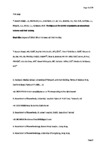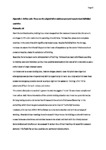The impact of the COVID-19 pandemic on anaesthesia trainees and their training
| dc.contributor.author | Sneyd, John | |
| dc.contributor.author | Mathoulin, S | |
| dc.contributor.author | O'Sullivan, E | |
| dc.contributor.author | So, V | |
| dc.contributor.author | Roberts, F | |
| dc.contributor.author | Paul, A | |
| dc.contributor.author | Cortinez, L | |
| dc.contributor.author | Ampofo, R | |
| dc.contributor.author | Miller, C | |
| dc.contributor.author | Balkisson, M | |
| dc.date.accessioned | 2020-07-05T14:36:28Z | |
| dc.date.issued | 2020-12-31 | |
| dc.identifier.issn | 0007-0912 | |
| dc.identifier.issn | 1471-6771 | |
| dc.identifier.uri | http://hdl.handle.net/10026.1/15839 | |
| dc.description | 12 months embargo applies but removed due to subject matter. | |
| dc.description.abstract |
Coronavirus disease 2019 (COVID-19; severe acute respiratory syndrome coronavirus 2 [SARS-CoV-2] has dislocated clinical services and postgraduate training. To better understand and to document these impacts, we contacted anaesthesia trainees and trainers across six continents and collated their experiences during the pandemic. All aspects of training programmes have been affected. Trainees report that reduced caseload, sub-specialty experience, and supervised procedures are impairing learning. Cancelled educational activities, postponed examinations, and altered rotations threaten progression through training. Job prospects and international opportunities are downgraded. Work-related anxieties about provision of personal protective equipment, and risks to self and to colleagues are superimposed on concerns for family and friends and domestic disruption. These seismic changes have had consequences for well-being and mental health. In response, anaesthetists have developed innovations in teaching and trainee support. New technologies support trainer-trainee interactions, with a focus on e-learning. National training bodies and medical regulators that specify training and oversee assessment of trainees and their progression have provided flexibility in their requirements. Within anaesthesia departments, support transcends grades and job titles with lessons for the future. Attention to wellness, awareness of mental health issues and multimodal support can attenuate but not eliminate trainee distress. | |
| dc.format.extent | 450-455 | |
| dc.format.medium | Print-Electronic | |
| dc.language | en | |
| dc.language.iso | en | |
| dc.publisher | Elsevier | |
| dc.subject | anaesthesia | |
| dc.subject | COVID-19 | |
| dc.subject | medical education | |
| dc.subject | mental health | |
| dc.subject | postgraduate medical education | |
| dc.subject | SARS-CoV-2 | |
| dc.subject | training | |
| dc.subject | well-being | |
| dc.title | The impact of the COVID-19 pandemic on anaesthesia trainees and their training | |
| dc.type | journal-article | |
| dc.type | Journal Article | |
| dc.type | Review | |
| plymouth.author-url | https://www.webofscience.com/api/gateway?GWVersion=2&SrcApp=PARTNER_APP&SrcAuth=LinksAMR&KeyUT=WOS:000572673400037&DestLinkType=FullRecord&DestApp=ALL_WOS&UsrCustomerID=11bb513d99f797142bcfeffcc58ea008 | |
| plymouth.issue | 4 | |
| plymouth.volume | 125 | |
| plymouth.publication-status | Published | |
| plymouth.journal | British Journal of Anaesthesia | |
| dc.identifier.doi | 10.1016/j.bja.2020.07.011 | |
| plymouth.organisational-group | /Plymouth | |
| plymouth.organisational-group | /Plymouth/Faculty of Health | |
| plymouth.organisational-group | /Plymouth/Users by role | |
| dc.publisher.place | England | |
| dcterms.dateAccepted | 2020-07-05 | |
| dc.rights.embargodate | 2020-7-28 | |
| dc.identifier.eissn | 1471-6771 | |
| dc.rights.embargoperiod | Not known | |
| rioxxterms.versionofrecord | 10.1016/j.bja.2020.07.011 | |
| rioxxterms.licenseref.uri | http://www.rioxx.net/licenses/all-rights-reserved | |
| rioxxterms.licenseref.startdate | 2020-12-31 | |
| rioxxterms.type | Journal Article/Review |



